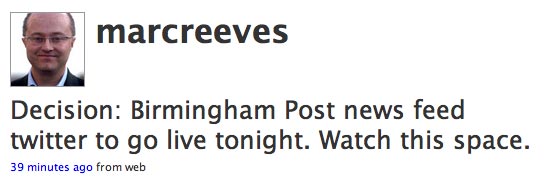Journalism.co.uk talks to reporters across the globe working at the collision of journalism and social media about how they see it changing their industry. This week, Steve Smith from The Spokesman-Review, USA.

1. Who are you and what do you do?
I am the editor of The Spokesman-Review, a 90,000 circulation daily serving several counties in eastern Washington state and north Idaho.
As editor, I supervise all news and editorial operations, including our website, our other digital platforms and our radio operations.
I have a staff of 124 full-time employees in the newsroom and an annual budget of about $9 million. I have been here since July 2002.
Before coming here, I worked in a variety of roles at seven other newspapers in six different cities.
2. Which web or mobile-based social media tools do you use on a daily basis and why?
I use YouTube daily because we post all of our multimedia on the site and also are capable of embedding YouTube videos on our blogs, including my blog, “News is a Conversation”.
I use MySpace and Facebook when hiring. We check the profiles/pages of prospective employees and actually have rejected applicants because of questionable behavior observed on their pages.
I also go into MySpace frequently to check on the pages devoted to our entertainment magazine, “7”.
In addition, I check several industry blogs daily. Several times a day, I check Romenesko, the must-read industry blog on the Poynter Institute for Media Studies site.
I do very little of this on my mobile, though I do use it for blog work, reading and posting.
I’m still somewhat of a troglodyte (no MySpace page of my own) so I don’t use the mobile to access video or social networking sites.
The Spokesman-Review is the pioneer newspaper (in the United States at least) for transparency. Our transparent newsroom initiative is built around interaction with people in our communities. Blogging and the various blogging tools are critical to us.
We also webcast news meetings and provide as much two-way interaction as possible via chats and other real-time opportunities. Increasingly, we’re developing transparency systems that work on mobile devices.
3. Of the thousands of social media tools available, could you single one out as having the most potential for news either as a publishing or a news gathering tool?
Blogging from the field has the most potential for us at the moment. We’re in the process of developing ideas for 7 that would have real non-media people posting live reports from concerts, nightclubs and other events.
We’re also involved in some beta proposals for training citizen journalists and giving them publishing platforms.
I have no idea where all of this will lead. We’re experimenting with some developing Google applications such as Google Maps and Google Street View to see how they might enhance our blogs.
4. And the most overrated in your opinion?
Tough question. I am willing to try anything with any tool. Until something proves to be useless, I won’t dismiss it.
I do believe our future isn’t in traditional online but in mobile media platforms, the potential of which is yet to be understood. That may drive us to networking tools that enhance the mobile experience.
To reference one single overrated tool, as it were, I’d have to mention Wikipedia. There is an enormous amount of information there. I go to the site often for informal searches. But journalists beware. It is a bottomless quicksand pool that will easily send reporters and editors off in the wrong direction, at best wasting time and, at worst, producing factually inaccurate, even humiliating journalism.



